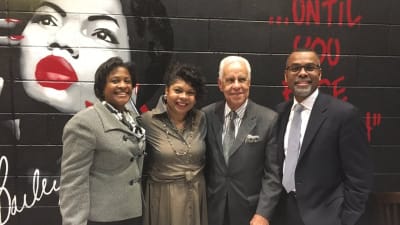A Panel on Race
With our second week at The School for Ethics and Global Leadership came an odd feeling of rhythm, like we’d been going to this school with these people for years and not nine days. We (mostly) know our schedules, know what counts as different kinds of fashion (casual, fresh, or formal, of course) and we finally know everyone’s names, even the dogs’!
We got a taste of something that makes SEGL so very SEGL on Tuesday night, when we went to a panel cohosted by the restaurant Busboys & Poets and the bookstore Politics & Prose. Interestingly, Politics & Prose is co-owned by frequent SEGL speaker Lissa Muscatine (also formerly Hillary Clinton’s lead speechwriter). Muscatine attended the panel and greeted the SEGL students warmly before the discussion began.
Led and moderated by April Ryan, Washington Bureau chief for American Urban Radio Networks, the panel was on race relations. The featured speakers were former Virginia Governor L. Douglas Wilder, the first African-American governor since Reconstruction; Eddie S. Glaude, Jr., chair of the Center for African-American Studies at Princeton University; and Wes Moore, who is the author of The Other Wes Moore, as well as a political analyst and former United States Army officer.
The panel served as a great midpoint to this week’s case study on the Rwandan genocide – many discussions in the dorms have revolved around racism during the genocide. Though it can be easy to pretend racism and its effects on politics are things of the past, the answers Wilder, Glaude, and Moore gave exposed that racism is definitely still prevalent in the nation today.
All 24 SEGL students arrived early enough at Busboys & Poets to order coffee and food and settle down in the first few rows of the room the restaurant had designated for the panel. It turned out to be great seating, as many SEGL students asked questions (of course, we followed up our quick introductions with, “…and I attend The School for Ethics and Global Leadership,” much to our speakers’ amusement after the third mention).
From questions on racism’s effects on international crises to advice for black youth seeking higher education to thoughts on a united front of youth of color determined to change society’s views, SEGL students of all backgrounds offered discussion questions both during the main panel and during the round-robin, rapid-fire session at the end.
All three speakers contributed to very SEGL-esque topics: phrases such as Glaude’s “value gap” (the moral, or not so moral, idea that certain demographics matter more than others), Wilder’s advice to the youth to remove prejudices for better collaboration between groups and Moore’s statement that “people don’t become great leaders, they are pushed to be great leaders” all echoed discussions that happened in classrooms, in dorms or on the commute to and from the academic building during the first SEGL week.
Possibly the greatest takeaway from the program was the fact that we were there at all – it was a little surreal to walk out after getting a book signed by the White House correspondent for three different presidents, getting academic advice from a Princeton professor, shaking the hand of a governmental trailblazer like Wilder and taking a selfie with an incredibly inspiring social entrepreneur and realize that this was just another day at SEGL. Opportunities like this panel will come up often in our school meetings, when we vote on weekly plans, and after such positive feedback from the first one, I’m sure many motivating, thought-provoking panels like this one will follow during this semester.
Read Maria’s blog post about her first week on the Hockaday School’s Fourcast web site here.
![]()








